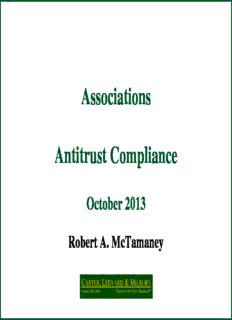
Antitrust Trade Associations Compliance Slides - October 2013 PDF
Preview Antitrust Trade Associations Compliance Slides - October 2013
Associations Antitrust Compliance October 2013 Robert A. McTamaney General Antitrust Principles • Competition Benefits Customers • Greater Scrutiny of Dealings With Competitors Than With Suppliers or Customers • “Market Power” = Monopoly Power = Additional Burdens • The Power to Set Prices Without Effective Competitive Response. • Actions Supported by Legitimate, Pro- competitive, Non-coercive Business Purposes Generally Fine CARTER, LEDYARD & MILBURN www.clm.com Partners for Your Business® Basic Rules for Antitrust Compliance • Competitors may not agree with competitors – On prices, or on terms of sale. – To allocate customers, territories, or markets. – Not to compete, such as bid-rigging – On prices for goods or services they are purchasing – To boycott suppliers/customers for anti-competitive ends – On levels of production or service. • Companies may not use dominant market positions to monopolize a market, control prices, or exclude competitors. Generally, Market Power = Monopoly. CARTER, LEDYARD & MILBURN www.clm.com Partners for Your Business® Sherman Act - Section 1 • Forbids Contracts, Combinations or Conspiracies in Restraint of Trade. • Violation Is a Felony. • Unilateral Action = Legal • Same Concerted Action = Illegal CARTER, LEDYARD & MILBURN www.clm.com Partners for Your Business® Per Se Antitrust Violations • Price Agreements With Competitors • Market or Customer Allocation Agreements • Agreements to Limit Service or Boycott Customers or Suppliers • Agreements on Terms and Conditions of Sale or Purchase • Resale Price Maintenance Now Rule of Reason under Federal law, still per se illegal in some states CARTER, LEDYARD & MILBURN www.clm.com Partners for Your Business® Law Regarding Conspiracies • Agreement Between Two or More Persons to Accomplish an Unlawful Objective or a Lawful Objective By Unlawful Means • Agreement May Be Inferred From Conduct • Things You Can Do Alone You Cannot Do With Others • Liable for Acts of Co-conspirators • Withdrawal Requires Affirmative Act – Contact Authorities – Not Just Stop CARTER, LEDYARD & MILBURN www.clm.com Partners for Your Business® “Rule Of Reason” Antitrust Issues • Balance Restrictions vs. Benefits • Bona Fide Joint Ventures • Sharing Information With Competitors • Agreements With Customers or Distributors to Refuse to Deal With Others • Tying – Conditioning Sale of One Product (with market power) or Service on Buyer’s Purchase of Another • Exclusive Dealing; Resale Price Maintenance CARTER, LEDYARD & MILBURN www.clm.com Partners for Your Business® Sherman Act - Section 2 Forbids Monopolizing or Conspiring or Attempting to Monopolize. CARTER, LEDYARD & MILBURN www.clm.com Partners for Your Business® Section 2 Violations • Use of Unfair Means to Acquire or Maintain Monopoly Power • Use of Essential Facilities to Monopolize • Monopoly Leveraging – Use of Market Power in One Market to Create a Competitive Advantage in Another Market • Predatory Pricing – Pricing Below Cost to Drive Out Competitors CARTER, LEDYARD & MILBURN www.clm.com Partners for Your Business® Clayton Act and FTC Act • Section 4 – Private Action; Treble Damages, Attorneys Fees and Costs • Section 5 – Guilty in DOJ Suit Is Prima Facie Evidence of Liability in Civil Suit • Section 7 – Prohibits Mergers and Acquisitions Likely to Lessen Competition. (HSR Pre-Merger Notification) • FTC Act Section 5 – “Unfair Methods of Competition” CARTER, LEDYARD & MILBURN www.clm.com Partners for Your Business®
Description: